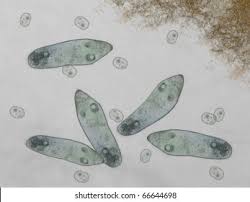
Is this a unicellular organism or a multicellular organism?
Unicellular
Which way does a solute flow?
From high to low concentration or low to high?
High to low concentration
A student studied the concept of order in the human body. Which statement best summarizes how part of the human body is ordered?
Cells are organized to form tissues
Tissues are organized to form cells
Body systems work together to form tissues
Tissues work together to form atoms
Cells are organized to form tissues
What are the 4 steps in a feedback loop?
Stimulus
Receptor
Control Center
Effector
What is the primary function of a sensory receptor?
To transmit signals to the brain
To decide how your body reacts
To amplify sensory signals
To filter out irrelevant stimuli
To transmit signals to the brain
Why are viruses not alive?
They do not move
They do not have DNA
They do not have cells
They do not have a protein capsid casing
They do not have cells
Which of the following best describes osmosis?
The movement of sugar molecules across a membrane
The movement of water molecules across a semipermeable membrane
The movement of salt molecules through cell walls
The random movement of all molecules in a solution
The movement of water molecules across a semipermeable membrane
Which organ is NOT part of the digestive system?
Stomach
Small intestine
Lungs
Esophagus
Lungs
Explain what the receptor does?
It sends signals to your brain so that it can decide how to respond to stimuli.
You are walking barefoot on a hot sidewalk. Which type of sensory receptor is most likely being activated, causing you to feel the heat and potentially pull your foot up?
Mechanoreceptors
Thermoreceptors
Olfactory receptors
Audioreceptors
Thermoreceptors
Is this a unicellular organism or a multicellular organism?:max_bytes(150000):strip_icc()/139812087-56a2b3cd3df78cf77278f2cb.jpg)
Multicellular
Explain the role of the cell membrane in maintaining homeostasis.
The cell membrane allows certain things in and out of the cell. This could be water, sugar, salt, and oxygen. By deciding what goes in and out, this allows our cells to have a balanced amount of these molecules that are necessary for us to grow and thrive.
What is the main function of the circulatory system?
Breaking down food into nutrients
Filtering waste from blood
Transporting oxygen and nutrients throughout the body
Controlling body movements
Transporting oxygen and nutrients throughout the body
Give me an example of a negative feedback loop
Shivering to get warm
Leaving a sunny spot to get cool
Going inside to get warm
Drinking water to get hydrated
You are cooking dinner and notice a strong smell of burning food. Which sensory receptors are being activated?
Chemoreceptors
Thermoreceptors
Mechanoreceptors
Photoreceptors
Chemoreceptors
What is the main difference between a prokaryotic cell and an eukaryotic cell?
Think about size and which ones have membrane enclosed organelles.
Only eukaryotic cells have their genetic material enclosed in a membrane bound nucleus
A biologist compares the behaviors of some fish that live in habitats with different amounts of salt.
How does regulating salt intake affect the fishes ability to survive?
By maintaining a water balance inside and outside of their bodies
By allowing them to conserve heat as water temperature changes
By helping them adjust their mass to improvement their movement through water
By providing energy to their body cells in water with low oxygen levels
By maintaining a water balance inside and outside of their bodies
When air moves into the lungs, oxygen __________
diffuses across the membranes of the alveoli and exits the blood
is converted to water
diffuses across the membranes of the alveoli and enters the blood
is converted into carbon monoxide
diffuses across the membranes of the alveoli and enters the blood
What is an example of a positive feedback loop
Having a fever
Giving birth
It’s a cold and snowy spring day in West Carthage, NY. Explain how your body responds to the cold using sensory input (information from your five senses) and maintains homeostasis in your body.
Your body uses it thermoreceptors on its skin to feel the cold of the air. It sends a message to your brain to tell your body to shiver and hopefully go inside. Once you are back inside, your body will go back to its normal temperature, you will stop shivering and return to homeostasis.
What organelles aides in cell division for the animal cell
Centrioles
Now, picture a saltwater fish named Finneas, who lives in the Atlantic ocean. Finneas is somehow transported to the freshwaters of Ontario Lake.
Will his cells be hypotonic, hypertonic, or isotonic?
Will he be able to maintain homeostasis?
Hypotonic
No
Explain how the nervous, skeletal and muscular systems work together to enable a person to move in an environment.
The brain tells the muscles to move by sending signals through the nerves. The muscles then pull on the bones causing them to move.
It’s a cold and snowy spring day in West Carthage, NY. Identify what feedback loop you will use to get warm again
What receptors does Sarah use to smell her grandmamas chocolate chip cookies.
Olfactory